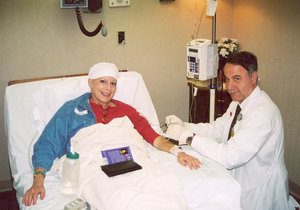The Roller Coaster Chronicles: A baseless conclusion dampens our hope

The radiation oncologist begins infusion of RIT.
photo by Alex de Parry
Readers: The events in these installments, the condensed version of my book, occurred in 2002. To catch up from the beginning, these chronicles start here.
When the treatment that might save my life was scheduled for Sept. 11, 2002, it seemed irreverent to hope for a personal victory on a day of collective national mourning: the first anniversary of the worst attack on American soil in our nation's history. But Alex and I did hope.
The sun was just beginning to peer over the horizon when we left home for the hospital where I would have the second dose of RIT — the full blast — which would, hopefully, kill all the cells that had been so determined to kill me. In the car, newscasters on the radio recalled the tragic events of one year earlier, but as the sun's rays began to bathe the earth with radiant beams, I couldn't help but break into song, "Oh what a beautiful morning. Oh what a beautiful day. I've got a beautiful feeling. Everything's going our way." Alex smiled and patted my hand and failed to mention that my vocal chords have a range of one note which is reliably flat.
We first met with Dr. Doom who declared that Zevalin would work for me for six months — maybe. Wait a minute. He had estimated 10 months at our previous meeting, and I didn't appreciate him stealing four months. I just wanted Dr. Doom to be quiet, so I told him to quit worrying, that I would be around to change Alex's bedpan in our old age. Alex rolled his eyes.
Treatment that day consisted of a monoclonal antibody followed by the full radioactive component of RIT. Just moments before the monoclonal antibody infusion began, a sharp pain stabbed at my right side, so intensely that I could barely breathe. The nurse called Dr. Doom, who ordered Motrin, and the infusion got underway.
Convinced that this was the day that treatment would end and our lives would return to normal, I was exuberant, despite the pain. I'd brought pom-poms and a card for Alex which thanked him for being my biggest cheerleader, and he laughed when I gave them to him. And then he turned on the TV. Somberly, we watched the faces of mothers and fathers, sons and daughters, and brothers and sisters who were killed in that horrific attack one year earlier. I suspected that any one of them would have traded places with me for an extra year of life, even if it meant going through all that we had for the past eight months. Soon, the drugs kicked in, and I dozed off.
Four hours later, the infusion was complete, and the pain in my side was still stabbing. Again, the nurse checked with Dr. Doom. She returned with additional Motrin and a bomb for an explanation, reporting matter-of-factly, "The doctor feels that the cancer has spread to your bone. Here's a prescription for pain." And then she left the room.
Just waking up, I didn't fully absorb what she said, but Alex did. And he was furious. No doctor had examined me for this symptom. No test had been taken to determine what might be causing it. And no one made a single suggestion about what to do if it were true, unless you count the prescription for painkillers. And if that was the best they could do, the outlook was indeed bleak. Every bit of Alex's hope vanished, and he wondered what horrors were next.
Panicked but struggling to remain calm, Alex wanted to leave and call Dr. Kaminski, knowing that he would have investigated with appropriate tests before simply jumping to a conclusion without them. But Zevalin was on its way, and he remained at my side.
I hadn't forgotten the bad news, but I refused to allow anything to get in the way of wholeheartedly believing that I was going to live. As the drug dripped into my veins, tears of joy streamed down my cheeks, with gratitude to the countless people who had helped to propel me to that moment time and give me a second chance. Tears welled in Alex's eyes, too, but I later learned that his were tears of impending grief.
Within a half hour and without fanfare, my cells were thoroughly bathed in radioactive missiles. As we exited the hospital, I was sure they were busy annihilating every cancer cell in my body. Pain and all, I threw my hands in the air, danced in circles, and reveled, "We have our life back!"
Why did the look on Alex's face seem to disagree with me? Because he knew better. He was simply too kind to remind me that my body was so toxified from months of treatment that it would take some time to recover. And there was that little bone cancer issue.
Next Friday, Dec. 3: Alex to the rescue. Again.
Betsy de Parry is the author of The Roller Coaster Chronicles and host of a series of webcasts about cancer. Find her on Facebook or Twitter or email her.

